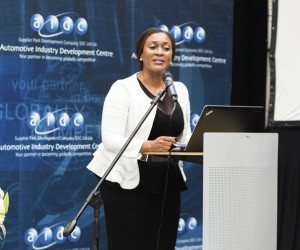The importance of training partnerships in the automotive industry.
The key to the success of their winning programmes is the psychological support programmes in place to create well rounded and healthy students, says Portia Mkhabela, Department Manager for Skills and Training at the Automotive Industry Development Centre (AIDC), this year’s Achiever Awards Best Training Partnership Programme winner, in an exclusive interview.
Can you elaborate on the current state and quality of skills in the automotive industry?
In our quest to implement NQF aligned qualifications, there has been an increase in providers focusing more on foundational learning standards due to the fact that the basic education system quality is still low and thus affecting the quality of students entering the TVET/HET space. This has an effect on the calibre of students the automotive industry needs to attract. A Bridge-in course in this instance is critical in addressing the quality of foundational learning.
Much work has been done over the past year with regard to skills development and training in the automotive sector. How are we looking, compared to a year ago, and what progress have been made?
The automotive sector has now adjusted its effort toward enterprise development and full compliance to the new BBBEE codes, therefore workplace skills planning process from industry, seeks to align to programme which gives an opportunity for people living with disabilities and place more emphasis on new technology which drives the automotive sector. Most of these programmes are implemented through our Gauteng Automotive Learning Centre, which is now also internationally certified as a FESTO Authorised Centre for Training.
Can you highlight some of the biggest achievements of the past year?
The AIDC’s full commissioning of our Learning Centre, which is situated in Rosslyn and servicing the Gauteng automotive sector, and the fact that it is the first FACT certified centre in the Sub-Saharan region, are worth mentioning.
Please tell us about the specific training partnership programme that won the AIDC the Best Training Partnership Programme category in the recent Achiever Awards.?
The City of Tshwane and Nissan South Africa, project managed by the AIDC, have successfully completed the Automotive Component Manufacturing and Assembly level 2-3 with a total of 150 students. This has ensured the successful completion of both levels in record time whilst creating much needed capacity within the automotive industry.
Can you tell us about the importance of partnerships in your business?
Partnerships create synergy in the implementation of the QCTO based training methodology, and it also reduces unnecessary wasteful expenditure which results in students dropping out and not completing the training programme. Partnerships also allow the articulation of theory and practical processes.
In your opinion, what gives this programme the edge?
I believe that the support system, which is well managed within the AIDC (Finance, HR, Payroll and ICT), ensures that all our programmes are implemented professionally, and the project management capability, which the AIDC training and development team possesses, gave us the edge.
Please tell us about the role the AIDC has played in developing skills and training in the automotive sector and its contribution to society and the country’s economy?
The AIDC’s team of professionals has a wealth of knowledge in their different environments. They have the ability to create and sustain key strategic projects which are sustainable and backed by a well-thought out feasibility study that builds on the continuous success of the organisation. Stakeholder relations management also supports the developmental agenda and the transformation of the automotive sector. Key partnerships and collaboration with universities, universities of technology and TVET Colleges will improve the quality of skills development in the automotive sector.






